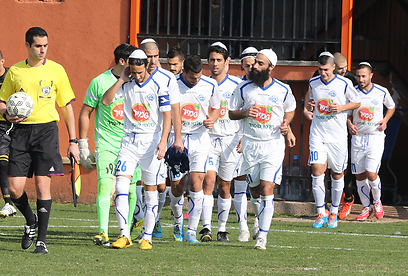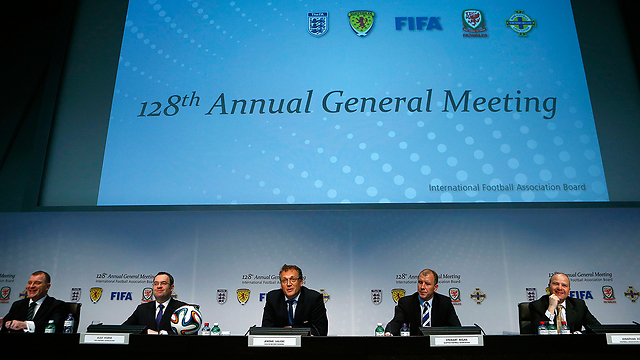
Maccabi Jaffa players don kippas
Photo: Oren Aharoni
Soccer's rules-making panel approved wearing religious head-covers for players of both sexes and of all religions Saturday, following a two year pilot.
Two years ago, the panel, known as IFAB, approved the use of headscarves for Muslim women players, reversing a ban on the Islamic hijab that was enforced in FIFA competitions for five years.
IFAB approved the modification an internal rule governing "The Players’ Equipment" specifying the provisions by which male and female players can now wear head covers.
Related stories:
- FIFA panel approves Islamic headscarves for women
- FIFA rejects Iran complaint over Islamic scarf ban
According to the panel "after a two-year pilot, the IFAB agreed that there was no indication as to why the wearing of head covers should be prohibited."
"We had a request from the Sikh community to play with headgear and to avoid discrimination against men, it was decided that what applied to women can apply to men," said FIFA secretary general Jerome Valcke.
"We will work exactly on the definition on these covers."
Nonetheless, the panel also decided that players will no longer be able to raise their shirts and reveal a slogan or message on an undergarment even if it is one of solidarity.
Overt slogans have long been banned by FIFA, world soccer's governing authority, but players often lift up their shirts after scoring to show other messages like birthday greetings or a message for the birth of a baby.
"From now on there can be no slogan or image whatsoever on undergarments even good-natured ones. This will apply from June 1 and will be in force for the World Cup," Valcke said.
Although many slogans that players display are of solidarity, Valcke said it had been decided to impose a blanket ban to avoid confusion.
"It's easier to say no," he said. "Sometimes, we are criticized for saying no but what is the definition of a nice message?"
Reuters contributed to this report

















